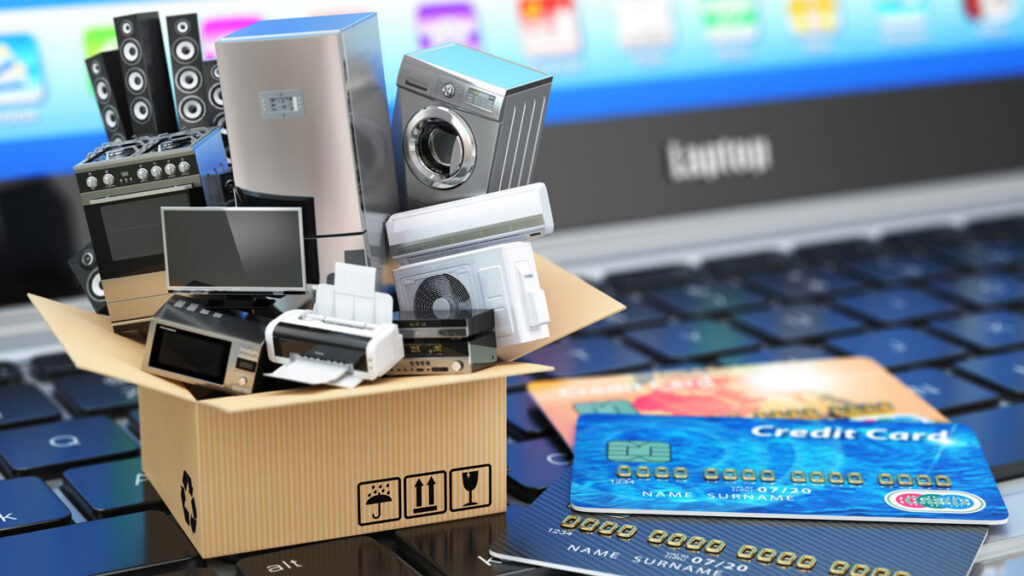
Updated: 12/03/2024
 As the cost of living crisis in the UK continues, many of us are looking for ways to save more and spend less. But sticking to a budget isn’t always easy. Thankfully, though, there’s a wide range of budgeting apps that can help with your financial planning.
As the cost of living crisis in the UK continues, many of us are looking for ways to save more and spend less. But sticking to a budget isn’t always easy. Thankfully, though, there’s a wide range of budgeting apps that can help with your financial planning.
Most budgeting apps enable you to keep track of your spending and highlight any areas where you can make cutbacks. Some common features of these apps include expenditure tracking, automated savings and bill payment notifications — but some are more sophisticated than others.
The basic apps tend just to give you an overview of your income and outgoings so you can see where you can make changes, but the more comprehensive ones will monitor your expenditure for you.
Many can be connected to your bank accounts and credit cards to provide even more insights about your financial situation.
With so many budgeting apps to choose from, we thought it would be helpful to compile a list of our favourites so you can decide which one is best for you. Continue reading to find out what they are.
What are the best budgeting apps of 2024?
Mint was one of the most popular free budgeting apps available, but Intuit Inc. decided to officially discontinue it, which means users will no longer be able to access it from the 23rd of March, 2024.
So, with many users looking for a replacement, we’re about to reveal the top apps to eliminate budgeting stress and help you manage your money effectively.
Our top budgeting apps of 2024 include YNAB, Emma, Snoop, Money Dashboard, Plum, Money Hub, Wally and Goodbudget. Most of these apps are free to download with the option of paying a subscription fee to upgrade and unlock extra features.
Jump to:
YNAB
Rather than simply tracking your expenditure, YNAB (You Need a Budget) provides a complete overhaul of your finances. Boasting an extensive array of features, it does take a while to get set up and learn everything, but there’s a workshop, guide and video to help you learn the basics. Additionally, YNAB provides educational resources to help you budget, with the end goal of getting you one month ahead with your finances.
While there is no free subscription option, you don’t have to pay for the first 34 days, and it has many other benefits over some free budgeting apps, such as an emphasis on privacy and security and unrivalled customer service.
Cons:
- With a 34-day free trial, users can experience the app’s features and decide if they want to subscribe.
- The app enables you to overhaul your finances completely, monitoring your spending and making changes that ensure you save more money.
- Impressive security features, including encryption and two-factor authentication.
- A dedicated customer support team who will answer your questions and be there when you need them.
Cons:
- With an extensive suite of features, the app takes a while to get to grips with.
- Users can’t benefit from a free subscription option, making it unsuitable if you’re searching for a free app.
- There can be issues with syncing, with some users struggling to track investments properly.
- While some apps let you pay bills directly through them, YNAB doesn’t have this feature.
Who should use YNAB?
With its extensive features, YNAB is best for people who want to put time and effort into money management. While simple budgeting apps give you an idea of spending habits, YNAB is an intricate platform that offers unparalleled clarity.
Apple App Store rating: 4.8
Google Play Store rating: 4.7
Cost: £12.99 per month or £86.99 for an annual subscription.
Emma
Emma is arguably one of the best well-known budgeting apps in the UK. Like many other money-tracking apps, it allows you to link your bank account and credit card, create a budget and identify the areas that need improvement.
What sets it apart are features like the ability to connect to compatible cryptocurrency accounts and pension accounts, the option to invest in stocks and shares and cashback offers on hundreds of retail partners.
Another bonus is that, with Emma, you don’t have to disclose your bank details, as payments via the app are made using QR codes and payment links. The ability to send payment reminders also enables you to recover money quickly.
Pros:
- Emma’s user-friendly interface makes it popular among a range of users. You don’t need much to get started, and the app is seamless to navigate.
- Budgeting is no longer a stressful experience, as users can track their subscriptions, making changes as and when needed.
- The daily updates on your account balance mean it’s easy to stay on top of your finances.
- Some apps don’t enable cryptocurrency accounts, which is where Emma shines.
Cons:
- The free tier does offer some functions, but you’ll need to pay to utilise the app’s many features.
- In most cases, Emma should connect with your bank. However, users with rarer accounts might find the app doesn’t support them.
- You can use the app for general investment monitoring, but detailed tracking requires a more advanced platform.
- The app focuses more on its paid features, meaning free users might get fewer updates.
Apple App Store rating: 4.7
Google Play Store rating: 4.2
Cost: Free – £14.99 per month
Snoop
As well as having all the typical features of a budgeting app (such as linking all your financial accounts, tracking your income and expenses and receiving insights to help you manage your finances better), Snoop gives its users access to money-saving deals on services like broadband, mobile phone contracts and mortgages. Additionally, it finds discounts and vouchers for the places you spend your money.
You can subscribe to Snoop for free; however, its paid subscription option is affordable at just £3.99 per month, and you get a range of additional features, like net-worth tracking, payday budgeting and custom spending reports.
Cons:
- Snoop is one of the more cost-effective apps available, with the premium plan offering more features for less money.
- Users can access money-saving deals on services like broadband, mobile phone contracts and mortgages and find discounts and vouchers for the places they shop.
- The budgeting function lets you get a comprehensive view of your spending behaviours.
- Plus users can also track their net worth, which is always helpful if you want to see where you stand.
Cons:
- Snoop doesn’t offer investment integrations, making it unsuitable for people who want to track their portfolios.
- You’ll have to upgrade to get all the features (although £3.99 a month is very reasonable).
- Its tools aren’t as powerful as some of the other budgeting apps in this list, which might be a dealbreaker.
- Some users have complained about app crashes, leading to them uninstalling and reinstalling it.
Apple App Store rating: 4.6
Google Play Store rating: 4.4
Cost: Free – £4.99 per month
Plum
Plum enables you to link bank accounts and credit cards, transfer funds between accounts, track your money and analyse your spending.
One of its best features, though, is the automatic savings feature, which rounds up your transactions to the nearest pound and automatically deposits the difference into a ‘Spending Pocket’. You’ll get between 0.5 and 1.01 percent interest on these savings, depending on the subscription you have. With the ‘Ultra’ subscription, you’ll also get a debit card, and you won’t incur foreign transaction fees when you spend your money in other countries.
Cons:
- It helps you save money by rounding up your purchases and putting the difference into an interest-bearing savings account and can help you switch to cheaper service providers.
- Users can also access free savings accounts and ISAs.
- The mobile app is simple to use with seamless navigation features.
- If you’re unsure about paying for a subscription, the app’s free tier gives you some great features.
Cons:
- Plum is ideal for newbies, but experienced investors might want something more advanced.
- You can’t instantly access your money, and investment fees apply.
- Customer service is only available at certain times, which might not be ideal if you want 24/7 support.
- The app focuses on investing, while other tools provide a comprehensive suite of features.
Apple App Store rating: 4.7
Google Play Store rating: 4.6
Cost: Free – £9.99 per month
Koody
As a manual budgeting app, Koody doesn’t connect to your bank account but enables you to input transactions manually. While some people would prefer an automated app, Koody is ideal if you want more control over which transactions you monitor.
One of the most popular app features is the budgeting categories, allowing users to separate their spending into 20 budgets, including rent, bills, going out and miscellaneous expenses.
A colour-coded graph highlights where you spend the most money, and you can adjust accordingly. Users can upload receipts, giving the app a degree of convenience, and the resources provide advice on budgeting.
The pro features are available for just £1 monthly or £10 annually, making it one of the most cost-effective budgeting solutions.
Pros:
- Manual budgeting means you can avoid connecting the app to your account.
- Its premium features are affordable, and users can save further by upgrading to an annual subscription.
- Different currency options are available, making the app suitable for international transactions.
- You can personalise the app to your preferences.
Cons:
- Some people might find the manual features too time-consuming.
- You might have problems setting the app up initially, and its features can be complicated.
- There’s no real-time data for transactions. The app will only work if you regularly update it with receipts.
- The features don’t allow you to set complex goals, and few automated functions exist.
Apple App Store rating: 4.5
Google Play Store rating: 3.3
Cost: Free – £1.00 per month
Moneyhub
Moneyhub is another great budgeting app that lets you connect your current savings, credit and crypto accounts and your mortgage, pensions and investments. Suppose you have any incompatible accounts or ones that are non-digital (such as cash savings). In that case, the app allows you to track them manually so you have a complete overview of your financial situation in one place.
Like YNAB, there is no free subscription option, but subscribing to Moneyhub only costs £1.49 per month or £14.99 per year, which means you’re getting two months for free.
Cons:
- You can track all your transactions in one place, including non-digital ones, giving you a holistic overview of your finances.
- Many users find old pensions they had forgotten, improving their financial futures.
- A comprehensive suite of budgeting tools gives you insights into how you spend money.
- The goal-setting function lets you plan for the future and hit savings targets.
Cons:
- The free subscription option lasts only six months, but this should give you plenty of time to test the app.
- While the app has numerous integrations, it doesn’t hold money.
- Integrating with other platforms can be a bit hit-and-miss.
Apple App Store rating: 4.3
Google Play Store rating: 4.3
Cost: £1.49 per month or £14.99 annually
Wally
Despite being free, the basic version of this app has a great range of features. You can create shopping lists and bill reminders, you can link to your bank accounts and credit cards to view all your spending in one centralised location, and there’s a financial calendar that gives you an overview of your previous and upcoming transactions.
However, some of the best things about Wally are that you can scan and upload your bills and receipts and label them with your location so you know what you’ve spent and where.
You can also start groups with your friends and family to manage shared finances.
Cons:
- You can use Wally to upload bills and receipts and manage shared finances with friends and family.
- View accounts in one place and get a comprehensive view of spending habits.
- Seamless navigation features make Wally an app you’ll want to use.
- AI-powered insights and spending forecasts provide more clarity into how you manage money.
Cons:
- Wally customers can’t access support via telephone, which can be annoying.
- The app is most popular in China, the US and India, so some UK banks might be unable to connect.
- Individuals with sight issues might struggle to read the text.
- You’ll need to pay if you want to access customisable features.
Apple App Store rating: 3.3
Google Play Store rating: 2.8
Cost: Free – £8.99 per month
Revolut
Revolut’s unique offering is that it’s an international budgeting app that focuses on giving users convenience when they travel. Users can choose from various account types, including businesses and options for young people, with standard accounts being free.
With free money transfers on weekdays and AI-powered fraud prevention, the app is a go-to solution for travellers. However, it also has a suite of budgeting tools that give you a comprehensive view of where you spend money.
Setting up spending categories (or pockets) gives users control over how much they save and spend. Overall, Revolut is an advanced app with numerous functions. However, another app might be best if you don’t make international transactions.
Cons:
- There are low or free fees for international transactions and free transfers (up to £1000 a month).
- Revolut is a one-stop shop for sending money and monitoring your budget.
- The pocket features make it easy to set spending categories and change behaviours.
- If you go away and book with Revolut Stays, you’ll receive cashback for accommodation.
Cons:
- Some people find that Monzo and Starling Bank offer more features.
- Its lack of banking services means you can’t access lines of credit or overdrafts.
- Intensive security procedures mean the app can sometimes be frozen, compromising accessibility.
- As a digital-only app, you can’t reach the customer service team through telephone. Some with free accounts find the customer service is unreliable.
Apple App Store Rating: 4.7
Google Play Store Rating: 4.5
Cost: Free – £45 per month
Goodbudget
One of the best things about Goodbudget is its envelope budgeting feature, which allows you to split your spending into separate categories — such as groceries, utility bills and debt — and allocate a certain amount to each one to prevent you from overspending in certain areas. You can also track how much of your debt you’re paying off, and you’ll get regular budgeting reports, but one of the best features of this budgeting app is how user-friendly it is.
If you upgrade to the Plus version, you’ll get unlimited accounts and envelopes, you’ll be able to sync up to five devices, and you’ll get seven years of transaction history.
Pros:
- The basic features are straightforward to use and ideal for beginners.
- Regular budgeting reports let you track how much debt you’re paying off and monitor your spending.
- Take advantage of the free version and decide whether to upgrade.
- The app also offers plenty of resources to help users manage their money more effectively.
Cons:
- While the free version has some features, other apps offer more.
- You can’t connect it to financial accounts for expense tracking, which might be a dealbreaker for some people.
- Goodbudget is a simple money management app without investment integrations.
- Some users might need time to get used to navigating the platform’s more advanced features.
Apple App Store rating: 4.6
Google Play Store rating: 4.1
Cost: Free – £6.99 per month
Budget with a Getsby prepaid card
By downloading one of the budgeting apps listed above, you should be able to manage your finances better, but you can increase your chances of sticking to your budget with a Getsby prepaid card. Use it to pay for things like mobile app purchases or managing subscriptions, as you can only spend what you’ve loaded onto it, which means you can’t go over your budget.
Order your Prepaid Card today


